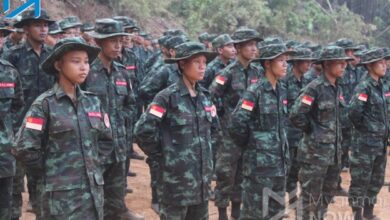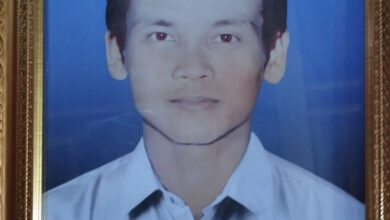
Media
Six media personnel were among thousands freed on November 17 as Myanmar junta chief Min Aung Hlaing declared a mass amnesty, according to local monitoring group Detained Journalists Information.

Former Mizzima correspondent Than Htike Aung, who was arrested in Naypyitaw in March last year while reporting on a hearing for ousted ruling National League for Democracy (NLD) party patron Win Htein, was among those released. He was sentenced to two years in prison after a year in custody and was released from Yamethin Prison in Mandalay Region. Other freed journalists were Ye Yint Tun and San Myint from Pathein in Ayeyarwady Region, La Pyae from Pyay in Bago Region, Aung Myo Htet from Shwebo in Sagaing Region, and Mya Wun Yan from Nyaungshwe in Shan State.
Former information minister Pe Myint, who served under the ousted NLD administration, was also released from reported house arrest in Naypyitaw on November 18 after being detained in the wake of last year’s coup. It is still unclear whether his deputy, former Reuters correspondent Aung Hla Tun, who was arrested at his Yangon home in mid-April last year, was also released.
Junta affairs
The amnesty—which also saw the release of 41 individuals imprisoned for alleged links to ethnic armed organisations—was welcomed by the Association of Southeast Asian Nations (ASEAN) special envoy to Myanmar, Prak Sokhonn, who is due to visit the country “in the coming weeks.”
In a statement released on the day of the amnesty, Sokhonn said that he regarded the move as “a sign of good will that opens up the possibility of finding a peaceful solution to the current crisis” through the regional bloc’s so-called “five-point consensus,” which has been widely criticised as an ineffective response to Myanmar’s post-coup conflict.
“The special envoy considers this mass prisoner release as an important gesture in the right direction to create a conducive environment for the commencement of a dialogue process among all concerned parties in Myanmar,” the statement said.
Despite the envoy’s praise, however, watchdog group the Assistance Association for Political Prisoners said that only 53 of the nearly 5,800 released were “political detainees,” while the rest were mostly criminal convicts.

Armed resistance
Regime authorities imposed a ban on the use of motorcycles in southern Yangon Region’s Kayan Township on November 18 following the shooting death of a junta-appointed administrator from Yoe Gyi, a village about 10km southwest of the town of Kayan, by two gunmen on a motorcycle. The ban was issued by the township’s General Administration Department, which claimed that anti-regime guerrilla groups based in the area had killed a total of 21 people in 25 attacks involving motorcycles since the coup. Residents say that around 80% of the township’s mostly rural population use motorcycles as their main means of transportation.
In June, the regime banned the use of motorcycles in Kawhmu Township, also in southern Yangon Region, following urban guerrilla groups’ attacks on regime authorities.
Ethnic armed organisations
The military has been attempting to take back an outpost seized by anti-regime armed groups near the Thai-Myanmar border in Karen State’s Myawaddy Township since November 17 using ground troops and air power, according to the Karen National Union (KNU). The KNU and allied resistance forces took control of the Thay Baw Boe outpost in May. Five junta troops, including the base’s deputy commander, were killed in that clash.
An officer of the Karen National Liberation Army, an armed wing of the KNU, told Myanmar Now that three battalions, including an artillery and a missile battalion, have been deployed in the effort to retake the outpost.
Around 2,000 locals living in three villages near the site of the fighting have been forced to flee their homes and have been sheltering along the Moei (Thaungyin) River, which separates Myanmar and Thailand.

![Resistance fighters holding heavy weapons ammunition in central Myanmar. (Photo: Freedom Revolution Force [FRF])](https://myanmar-now.org/en/wp-content/uploads/sites/5/2024/04/438869056_443267851680128_1706386881626943924_n-390x220.jpeg)

